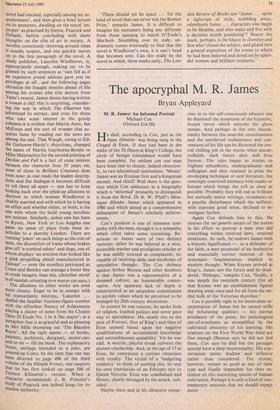The apocryphal M. R. James
Bryan Appleyard
M. R. James: An Informal Portrait Michael Cox (Oxford £14.50)
He died, according to Cox, just as the Nunc Dimittis was being sung in the Chapel it Eton. If they had been in the midst of the Te Deum at King's College, the circle of benign coincidence would have been complete, for seldom can one man have been tied so closely, indeed obsessive- ly, to two educational institutions. 'Monty' James was an Etonian first and a Kingsman second. And third? Well there is the ques- tion which Cox addresses in a biography which is 'informal' primarily to distinguish it from the Revd. Dr R. W. Pfaff's Mon- tague Rhodes James which appeared in 1980 and which aimed at a comprehensive delineation of James's scholarly achieve- ments.
Cox's position is one of immense sym- pathy with the man, though it is a sympathy which often takes some sustaining. Re- actions to James were of two distinct varieties: either he was beloved as a wise, accessible teacher and prodigious scholar or he was mildly scorned as complacent, in- capable of receiving ideas and intolerant of speculative thought. The Cox defence against Arthur Benson and other doubters is that James was a representative of a doomed culture, an honourable conser- vative. Any apparent lack of depth is reinterpreted as an unspoken commitment to ancient values which he perceived to be besieged by 20th-century dissections.
In essence he was reticent; he spoke little of religion, loathed politics and never gave way to speculation. His steady rise to the post of Provost, first of King's and then of Eton seemed based upon the negative qualifications of accumulated knowledge and untroublesome amiability. Yet he was odd. A wettish, playful streak subverts the austere scholarship. And, at the age of 17 at Eton, he contracted a curious obsession with royalty. The victim of a 'badgering tendency' to think of nothing else, he sent his own translation of an Ethiopic text to Queen Victoria. Eton was scandalised and Monty, clearly deranged by the attack, sub- sided.
Maybe there and in his obsessive resear-
cies in to the self-consciously obscure can be discerned the symptoms of the hypnotic, frozen terror which informs the ghost stories. And perhaps in the very discon- tinuity between this anarchic consciousness and the unrelieved ordinariness and con- ventions of his life can be discerned the cen- tral chilling jolt in the stories when uncon- trollable, dark forces alter dull lives forever. The tales began as stories to frighten schoolboys, undergraduates and colleagues and they retained in print the enveloping technique of oral literature, the cunningly contrived intimacy with reader or listener which brings the evil as close as possible. Probably they will end as brilliant but eternally minor writings, testaments to a psychic disturbance which the sufferer, with supreme good sense, declined to in- vestigate further.
Again Cox defends him in this. He stresses the sui generis nature of the stories in his effort to portray a man who did everything within received laws, received structures. As such, he endows James with a historic significance — as a defender of the faith, a man possessed of an instinctive and essentially correct mistrust of the systematic fragmentation implicit in modern thought. When Keynes arrived at King's, James saw the future and he shud- dered. 'Perhaps,' remarks Cox, 'finally, it was simply the twentieth century (for all that Keynes was an establishment figure) drawing away once and for all from the set- tled bulk of the Victorian shoreline.'
Cox is possibly right in his benevolent in- terpretation of James but he cannot stifle the infuriating qualities — his eternal avoidance of the point, his pathological out-of-touchness as exemplified by the cultivated obscurity of his learning. His orations on the First. World War dead are fine enough (Benson says he did not feel them, Cox says he did) but the passages quoted have a deep impersonality. His con- servatism seems shallow and reflexive rather than considered. The stories, however, remain as good as any of their type and finally dependent for their ex- istence on this unexciting species of human cultivation. Perhaps it is only a kind of con- temporary neurosis that we should expect more.






































 Previous page
Previous page